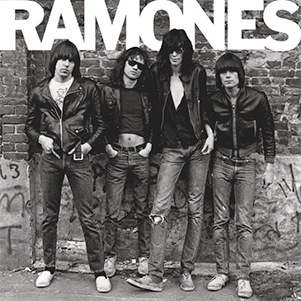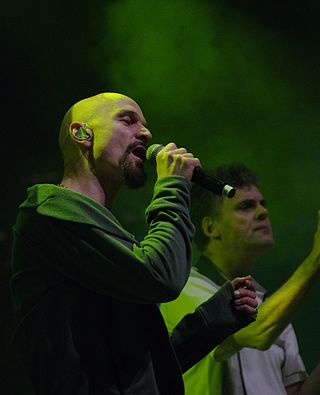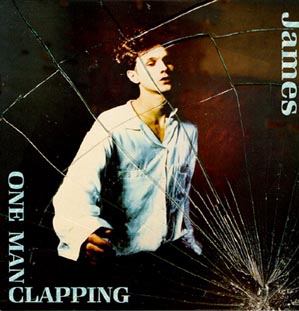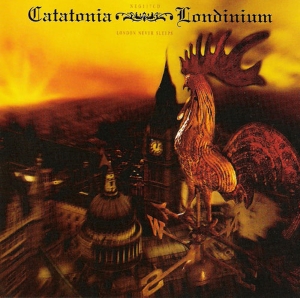
The Jesus and Mary Chain are a Scottish alternative rock band formed in East Kilbride in 1983. The band revolves around the songwriting partnership of brothers Jim and William Reid, who are the two founders and only consistent members of the band since its formation. They are recognized as key figures in the development of the shoegaze and noise pop subgenres. The band have had twelve top 40 entries and two top 10 hits in the UK Singles Chart in the course of their career.

Ramones is the debut studio album by the American punk rock band Ramones, released on April 23, 1976, by Sire Records. After Hit Parader editor Lisa Robinson saw the band at a gig in New York City, she wrote several articles about the group and asked Danny Fields to be their manager. Fields agreed and convinced Craig Leon to produce Ramones, and the band recorded a demo for prospective record labels. Leon persuaded Sire president Seymour Stein to listen to the band perform, and he later offered the band a recording contract. The Ramones began recording in January 1976, needing only seven days and $6,400 to record the album.

James are an English rock band from Manchester, formed in 1982. They achieved popularity during the 1990s, with four top-10 hits on the UK Singles Chart and nine top-10 placings on the UK Albums Chart. The band's best-known singles include "Come Home", "Sit Down", "She's a Star" and "Laid". "Laid" also became a hit on American college radio. Following the departure of lead singer Tim Booth in 2001, the band became inactive, but members reunited in January 2007 and have since released a further seven albums. Live performance has continually remained a central part of the band's output. As of 2010, the band had sold more than 25 million albums worldwide.

Pills 'n' Thrills and Bellyaches is the third studio album by the English rock band Happy Mondays, released on 5 November 1990 by Factory Records. Disc jockey (DJ) Paul Oakenfold and collaborator Steve Osborne were previously enlisted by the band for remixes. The success of these led to the pair producing "Step On", a cover of the John Kongos song, for Happy Mondays. The band went on a tour of the United States, and by the end of which, had started recording their next album with Oakenfold and Osborne at Capitol Studios in Los Angeles, California. They returned to the United Kingdom, where further recording took place at Eden Studios in London until September 1990. Described as a Madchester album, Pills 'n' Thrills and Bellyaches saw substantial input from Oakenfold and Osborne, with the former making loops while the latter handled song arrangements.

Laid is the fifth studio album by British rock band James. It was released on 27 September 1993 through Fontana Records. The album's sound, which is "stripped-down" compared to their prior releases, was inspired by their recent experience touring as supporting act to Neil Young. Enlisting Brian Eno as producer, James recorded for six weeks at The Windings in Wrexham, Wales, and Real World Studios in Box, Wiltshire. The sessions also resulted in the experimental sixth studio album Wah Wah (1994). Laid is a folk and pop rock album that was reminiscent of their earlier releases with its atmosphere and minimal arrangements.

Psychocandy is the debut studio album by Scottish rock band the Jesus and Mary Chain. It was released in November 1985 on Blanco y Negro Records. The album is considered a landmark recording: its combination of guitar feedback and noise with traditional pop melody and structure proved influential on the forthcoming shoegaze genre and alternative rock in general.

"Mulder and Scully" is a song by Welsh alternative rock band Catatonia, released as a single by Blanco y Negro Records from the band's second album, International Velvet (1998). The song makes direct reference to fictional FBI special agents Fox Mulder and Dana Scully, the two main characters of the popular American sci-fi TV series The X-Files who work on cases linked to the paranormal, called X-Files. In an interview Cerys Matthews, co-writer of the song, explained that while she was not a serious fan of the show, the basic premise of the series matched the concept of what she was trying to express.

Stutter is the debut studio album by English rock band James. Blanco y Negro and Sire Records released it on 28 July 1986. After going through multiple vocalists and guitarists, the band caught the attention of Factory Records. James released two EPs with the label; between them Larry Gott replaced guitarist Paul Gilbertson. The band supported the Smiths twice, before eventually signing with Sire. Between January and March 1986, the band recorded Stutter with Patti Smith live guitarist Lenny Kaye and engineer Gil Norton. Described as a folk rock album, the songs on Stutter tackle the topics of insects, reincarnation and being a tortured artist.

One Man Clapping is the third album from English band James, a live album released in March 1989. The album was recorded at the Moles Club, Bath, Somerset on the 14 and 15 November 1988. The album was issued on their own One Man imprint of Rough Trade Records, after parting company with Blanco y Negro/Sire. To fund the album, the band had to borrow £12,000 from the Royal Bank of Scotland. Initially, the bank manager was not willing to lend the band the money, but after seeing them live in Manchester he agreed.

Gold Mother is the third studio album by English rock band James. It was released on 4 June 1990 on Fontana Records. With the addition of drummer David Baynton-Power, violinist/guitarist Saul Davies, and keyboardist Mark Hunter, James released the single "Sit Down" in June 1989, before going to record their next album. Sessions were held at Out of the Blue in Manchester, The Windings in Wrexham, Wales, with three band members and Nick Garside producing. Described as an arena rock and indie rock album, Gold Mother was compared to the likes of U2 and the Waterboys.

Seven is the fourth studio album by English rock band James. It was released on 17 February 1992, through Fontana Records. After writing new material in their practice space, the band began recording at The Manor Studios. The sessions lasted for several months, with the band producing the proceedings themselves. After a lack of progress, Fontana halted the sessions, and sent them to work at Olympic Studios with Martin "Youth" Glover. Half of the songs were produced by Youth, while the remainder was produced between James and Steve Chase. Described as a stadium rock album, Seven drew comparison to the likes of Simple Minds and U2.

Pleased to Meet You is the ninth studio album by English rock band James. Less than a year after the release of Millionaires (1999), the band were playing new material live. Recording was split between Ridge Farm, Whitfield St., House in the Woods studios; producer credit was split between Brian Eno, guitarist/violinist Saul Davies, KK and the band. "Getting Away with It " was released as a single in late June, followed a week later by Pleased to Meet You on 2 July through Mercury Records.

Wah Wah is the sixth studio album by the Manchester-based English indie rock band James. After the success of their fourth album, Seven (1992), the band entered Real World Studios, Box, Wiltshire, to record their fifth album Laid in early 1993 with producer Brian Eno, with whom the group had longed to work. Prior to recording Laid, Eno observed the band's jam sessions at their Manchester rehearsal room, and considered these improvised pieces to be as important to the band's music as their eventually crafted songs. He requested to the group that whilst they were recording Laid, they would also concurrently record an album of their improvisations which Eno and, by Eno's request, second producer Markus Dravs would produce in a secondary studio in the Real World complex. Each composition started off with the band's improvisation being recorded, which Dravs would then edit, generally alone whilst James and Eno were recording Laid. Eno and Dravs would take a "promising" part of a recording and then mixed them only once. Tim Booth's desire to re-record some of his vocals caused friction in the studio.

Whiplash is the seventh studio album by English rock band James. It was released on 24 February 1997, through Fontana Records. Following the release of the band's experimental sixth studio album Wah Wah (1994), they began working on a follow-up in 1995 at drummer David Baynton-Power's home studio. Over the course of 1995 and 1996, James recorded at several studios – Westside, The Windings, Cafe Mullet, Real World, RAK, and Foel – with producers Stephen Hague, Brian Eno, and Baynton-Power. Described as electronic and folk rock release, the album mixed in elements of the band's previous two studio albums.

Millionaires is the eighth studio album by British alternative rock band James. During the Whiplash release cycle, guitarist Adrian Oxaal replaced founding member Larry Gott, and guitarist Michael Kulas joined the band. Touring to promote the release was cut-short when Booth injured his neck. With the release of The Best Of in early 1998, the band began recording their next album in May 1998. The sessions continued into February 1999 at a variety of studios: Ridge Farm, Hook End, Townhouse and Metropolis. While Brian Eno produced most of the record, the producer credit was also given to guitarist/violinist Saul Davies, keyboardist Mark Hunter, Steve Osborne, drummer David Baynton-Power and Faithless. Millionaires is an indie rock and pop release that drew comparison to Lou Reed and New Radicals.

Ice Hockey Hair is an EP by the Welsh alternative rock band Super Furry Animals, released in 1998. The record contains four songs which the band felt did not fit in with either their previous album, 1997's Radiator, or its follow-up Guerrilla. The title track refers to an alternative name for the mullet hairstyle. The EP's opening song, "Smokin'", was commissioned by British television station Channel 4 for a programme about sloth presented by Howard Marks. "Ice Hockey Hair" was later included on 'greatest hits' compilation Songbook: The Singles, Vol. 1, issued in 2004, while "Smokin'" appeared on 1998's B-side and rarities compilation Out Spaced.

Uncle Dysfunktional is the fifth studio album by English rock band Happy Mondays. It was released by Sequel Records on 2 July 2007. After the band reunited in 2004, they toured into 2005; by 2006, a new album was recorded with producer Sunny Levine. Initial sessions were held at The Studiosound in Rochdale and Make It Nice Studio in Leicester with Dave Parkinson, before moving to Moolah Rogue Studios in Stockport with Levine. Uncle Dysfunktional is an electro-funk record, with influences from country and hip hop.

"Sweet and Tender Hooligan" is a song by the English rock band the Smiths, written by singer Morrissey and guitarist Johnny Marr. Recorded in 1986, it was released as a single in May 1995 by Sire Records to promote the compilation album Singles.

"Befour" is a song recorded by English singer-songwriter Zayn for his debut solo studio album, Mind of Mine (2016). It was written by Zayn Malik, James Ho, Harold Lilly and Terrence "Scar" Smith, and produced by Malay. It was released as the third promotional single from the album on 17 March 2016 by RCA Records. "Befour" is a smooth R&B and synth-pop song, which incorporates musical elements of disco and soul music. It features four-on-the-floor beats, mellow synths, and a grinding guitar loop in its instrumentation. The song is also noted for Malik's high-reaching falsetto during the song's middle eight section.

"Londinium" is a song by Welsh band Catatonia from their third studio album, Equally Cursed and Blessed (1999). It was written by Mark Roberts with Catatonia and produced by TommyD and the band. Released on 12 July 1999, the song reached number 20 on the UK Singles Chart.



















